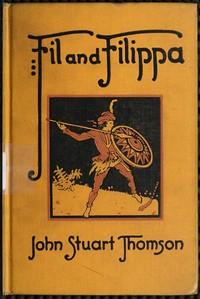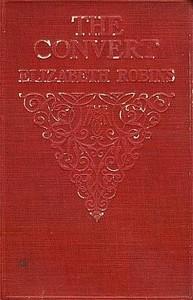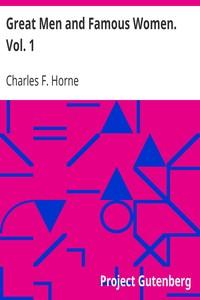Read this ebook for free! No credit card needed, absolutely nothing to pay.
Words: 88138 in 11 pages
This is an ebook sharing website. You can read the uploaded ebooks for free here. No credit cards needed, nothing to pay. If you want to own a digital copy of the ebook, or want to read offline with your favorite ebook-reader, then you can choose to buy and download the ebook.


: The Life of Gordon Volume I by Boulger Demetrius Charles - Gordon Charles George 1833-1885; Generals Great Britain Biography
CHAP. PAGE
THE LIFE OF GORDON.
BIRTH AND EARLY LIFE.
Charles George Gordon was born on 28th January 1833, at No. 1 Kemp Terrace, Woolwich Common, where his father, an officer in the Royal Artillery, was quartered at the time. The picture given elsewhere of this house will specially interest the reader as the birthplace of Gordon. It still stands, as described by Gordon's father in a private memoir, at the corner of Jackson's Lane, on Woolwich Common.
The name "Gordon" has baffled the etymologists, for there is every reason to believe that the not inappropriate connection with the Danish word for a spear is due to a felicitous fancy rather than to any substantial reality. There is far more justification for the opinion that the name comes through a French source than from a Danish. The Gorduni were a leading clan of Caesar's most formidable opponents, the Nervi; a Duke Gordon charged among the peers of Charlemagne; and the name is not unknown at the present day in the Tyrol. The "Gordium" of Phrygia and the "Gordonia" of Macedonia are also names that suggest an Eastern rather than a Northern origin. History strengthens this supposition and entirely disposes of the Danish hypothesis. The first bearer of the name Gordon appeared in Scotland at far too near a date to the Danish descents upon that country to encourage the view that he was a member of that most bitterly hated race. Nowhere were the Danes more hated or less successful than in Scotland, yet we are asked to believe that the founder of one of the most powerful families in that kingdom belonged to this alien and detested people. The silence itself of the chronicler sufficiently refutes the idea that the first Gordon was a renegade or a traitor, as he must have been if he were a Dane.
In all probability the first Gordon, who helped Malcolm Canmore, and received in return a large grant of lands in Berwick, which became known as the Gordon country, was one of the many Norman knights attracted to the Court of Edward the Confessor. Accepting for the occasion the popular legendary version of Shakespeare, rather than the corrected account of modern historians, he may be supposed to have found his way north to the camp of Siward, where the youthful and exiled Scotch Prince had sought shelter from Macbeth, and it is no undue stretch of fancy to suggest that he took his part in the memorable overthrow of that usurper at Dunsinane, and thus obtained the favour of his successor. The growth of the Gordon family in place and power was rapid. To the lands on the borders was soon added the Huntly country on Deeside, where Aboyne Castle now stands, and in a very short period the Gordons ranked among the most powerful and warlike clans of Scotland. As Sir Walter Scott wrote of Adam Gordon, in words which might be appropriately applied to the subject of this biography:
Be its remote origin what it may, no name has appeared more prominently or more honourably in the British Army Lists during the last century and a half than that of Gordon. One of the most famous of our regiments bears and has nobly upheld the name. In honourable and friendly rivalry with the equally numerous and equally distinguished clans of Grant and Cameron, the Gordons have figured on every battlefield from Minden to Candahar, thus establishing at the same time the political wisdom of Chatham, who first turned the Highlanders from a cause of danger into a source of strength, and the military ardour and genius of their own race. Thus it came to pass that the spirit of remote warlike ages was perpetuated, and that the profession of arms continued to be the most natural one for any bearer of the name Gordon. It is not surprising, therefore, to find that the practice of his nearest relations, as well as the traditions of his race, marked out Charles Gordon for a soldier's career.
Passing over an uncertain connection with the General Peter Gordon, who rose high in the Russian service under Peter the Great, the nearest direct ancestor of whom we can speak with absolute confidence was Charles Gordon's great-grandfather David Gordon, who served as a lieutenant in Lascelles' regiment of foot--afterwards the 47th Regiment--at the battle of Prestonpans. Although the majority of the clans were still loyal to the Stuarts, it seems from this that some of them had entered the Hanoverian service probably in that most distinguished regiment, the First Royal Scots, which a few years before Culloden had fought gallantly at Fontenoy. At Prestonpans David Gordon had the bad fortune to be made prisoner by the forces of Charles Edward, and he found on the victorious side the whole of the Gordon clan, under the command of Sir William Gordon of Park, a younger son of the Earl of Huntly. As he was able to claim kindred with Sir William, David Gordon received better treatment than he might have expected, and in a short time was allowed to go free, either on an exchange of prisoners or more probably on his parole. This incident is specially interesting, because, after making every allowance for the remoteness and vagueness of the old Highland custom of cousinship, it seems to bring Charles Gordon's ancestry into sufficiently close relationship with the main Gordon stem of the Huntlys. After his release David Gordon does not appear to have taken any further part in the war which terminated at Culloden, and he emigrated shortly afterwards to North America, where his death is recorded as having taken place at a comparatively early age at Halifax in the year 1752.
That he came of gentle blood is also proved by the fact that the Duke of Cumberland stood sponsor to his son, who bore the Duke's names of William Augustus. This second Gordon, of the particular branch that has interest for us, also entered the army, and held a commission in several regiments. The most memorable event in his life was his taking part in Wolfe's decisive victory on the heights of Abraham. In 1773 he married a lady, Miss Anna Maria Clarke, whose brother was rector of Hexham in Northumberland, and by her had a family of four daughters and three sons. Of the latter, two died at an early age, and only the youngest, William Henry, born in 1786, survived to manhood. He is especially interesting to us, because he was the father of General Gordon.
Like his father and grandfather, William Henry Gordon chose the profession of a soldier, and entered the Royal Artillery. He saw a great deal of active service, being with his corps in the Peninsula and at Maida, commanding at a later period the Artillery at Corfu and Gibraltar, and attaining before his death in 1865 the rank of Lieutenant-General. He was also connected with the Woolwich Arsenal as Director of the Carriage Department. He has been described as an excellent officer if a somewhat strict disciplinarian, and his firm character of noble integrity lived again in his sons. He married, in 1817, Elizabeth, the daughter of Samuel Enderby, a merchant whaler, one of those west country worthies who carried on the traditions of Elizabeth to the age of Victoria. It would not be possible to present a complete picture of Gordon's mother, and therefore none will be attempted here; but all the available evidence agrees in describing her as a paragon of women, and as having exercised an exceptional influence over her children. Gordon himself bore the most expressive testimony to her virtues and memory when, long years afterwards, he closed an exordium on the filial affection due to a mother with the outburst--"Oh! how my mother loved me!"
Such in brief were the forebears of the hero who comes next after Nelson in national veneration. To understand him and his career, it must be remembered that he came of a gallant race, with a quick sense of honour, seeing clearly the obvious course of duty, and never hesitating in its fulfilment. These qualities were not peculiar to the man, but inherited from his race, and as they had never been contaminated by the pursuit of wealth in any form, they retained the pristine vigour and fire of a chivalrous and noble age. What was personal and peculiar to Charles Gordon had to be evolved by circumstance and the important occurrences with which it was his lot to be associated throughout his military and public career, but his soldierly talent and virtue must be mainly assigned to the traditions and practice of his ancestors.
Of the five sons of General William Henry Gordon and Elizabeth Enderby, Charles George Gordon was the fourth. His eldest brother, Henry William Gordon, born in 1818, had entered the army, first in the 8th Regiment, and transferred in a short time to the 59th, when, at the early age of ten, Charles Gordon was sent off to school at Taunton. The selection of this school in the western country was due to the head-master, Mr Rogers, being a brother of a governess in the Gordon family. Little is known of his early childhood beyond the fact that he had lived, before he was ten, at Corfu, where his father held a command for some years. The Duke of Cambridge has publicly stated that he recollects, when quartered at Corfu at this period, having seen a bright and intelligent boy who occupied the room next to his own, and who subsequently became General Gordon. At Taunton Gordon remained during the greater part of five years, enjoying the advantages of one of the most excellent grammar schools in the West of England, and although he failed to make any special mark as a scholar, I find that, whether on account of his later fame or for some special characteristic that marked him out from the general run of boys, his name is still remembered there by something more than the initials cut upon his desk. If he distinguished himself in anything it was in map-making and drawing, and he exhibited the same qualifications to the end of his career. How careful and excellent the grounding at Taunton school must have been was shown by the fact that, after one year's special coaching at Mr Jefferies' school at Shooter's Hill, Gordon passed direct into the Royal Military Academy at Woolwich. It is noteworthy that during the whole of the period we are now approaching, he never showed the least tendency to extravagance, and his main anxiety seems to have been to save his parents all possible expense, more especially because they had a large family of daughters. To the end of his life, and in each successive post, Gordon was the slave of duty. At this time, and during the years that follow, down to the Chinese campaigns, his guiding thought was how to save his family the smallest expense on his account, and yet at the same time to hold his head high, and to show himself worthy of his race.
Free books android app tbrJar TBR JAR Read Free books online gutenberg
More posts by @FreeBooks

: Fil and Filippa: Story of Child Life in the Philippines by Thomson John Stuart Petersham Maud Illustrator Petersham Miska Illustrator - Philippines Social life and customs; Children Philippines


: Selections from Early Middle English 1130-1250. Part 1: Texts by Hall Joseph Editor - English literature Middle English 1100-1500





